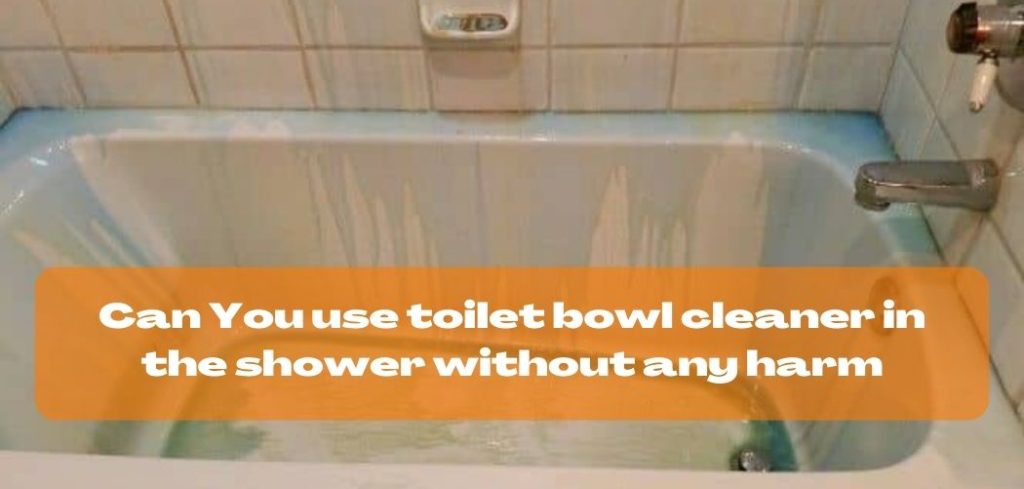Welcome to our discussion on an important cleaning topic: Can you use toilet bowl cleaner in the shower? When it comes to keeping our bathrooms clean, we often turn to various cleaning products to tackle stubborn stains and grime.
But with so many different types of cleaners available, it’s essential to understand which ones are safe and effective for specific surfaces. In this introduction, we will explore the potential risks and concerns associated with using toilet bowl cleaner in the shower.
We will delve into the reasons why it may not be the best choice for cleaning your shower and highlight the importance of using appropriate products to ensure both effectiveness and safety. So, let’s dive in and learn more about this common cleaning conundrum!
Can You use Toilet Bowl Cleaner in the Shower Without any Harm?

Toilet bowl cleaners contain more chemicals than other cleaning agents for a bathroom. But these products remove the stains from the bowl quickly. The toxic elements of the bowl cleaner are harsh for shower areas.
We all deserve a clean toilet and shower. Regular cleaning keeps the shower cleaner less dirty, and simple tiles cleaners can remove dirt. So, you should be careful about the cleaning agent.
The porcelain bowl of the toilet is good for using bowl cleaners because they can easily remove germs and dirt and keep the bathroom bowl hygienic. But it is not the same for shower surfaces. If you regularly use these cleaners for shower surfaces, they can damage gradually and lose the glossy, and the harsh chemicals hurt the tiles.
The Harmful Ingredients of Toilet Bowl Cleaner

You shouldn’t use toilet bowl cleaners in the shower because many cleaners have too many harsh ingredients: mainly bleach and hydrochloric acid. If your toilet bowl cleaner contains one of these active chemicals, you should keep it out of the shower.
Hydrochloric acid
Hydrochloric acid is a cleaning agent that effectively removes stubborn dirt and stains. Toilet bowl cleaners contain the agent. It removes the stains quickly. But this strong ingredient is very corrosive. So, when you use it for the shower, it can damage the tiles. Besides, it can burn your hands.
Bleach
Most toilet cleaners contain bleach, and it comes with whitening properties. Besides, it is a germ-killing agent. For this reason, it is the ingredient of toilet bowl cleaner. But this agent is not good for tiles and showers, and it damages the finish of the showerhead.
Ammonia
In cleaning dirt, another effective agent is ammonia. It also works as bleach. So, it damages the shower tiles. The residue of ammonia also attracts dirt.
What are The Alternatives to Toilet Bowl Cleaner for Showers?

You can use some simple and available ingredients from your kitchen to clean the shower instead of toilet bowl cleaners. They effectively clean the shower and shower tiles. Let’s see.
Vinegar
Vinegar has acidic properties. For this reason, it works well as a cleaning agent. But it is not so harsh as a toilet bowl cleaner. So, you can mix some vinegar with some water and make a solution. Then use it to clean the dirt and stains on shower tiles.
Vinegar With Baking Soda
If your shower tiles and grout get dirtier, you can use vinegar and baking soda to clean them safely. Mix the right amount of the two ingredients and clean the tiles.
Conclusion
While it may be tempting to use toilet bowl cleaner in the shower as a quick and easy cleaning solution, it’s important to exercise caution. Toilet bowl cleaners are specifically formulated for use in toilets and contain strong chemicals that can be harsh and potentially harmful to other surfaces, including your skin and shower fixtures.
Using toilet bowl cleaner in the shower may result in damage to your shower tiles, grout, or other materials, and may also cause skin irritation or respiratory issues due to the potent fumes. Additionally, toilet bowl cleaners are not designed to tackle soap scum, mold, or other common shower stains, so their effectiveness may be limited.
To ensure the safety of your shower and yourself, it’s best to use cleaning products that are specifically formulated for showers or bathroom surfaces. Always read and follow the instructions on the label of any cleaning product, and if you have any doubts or concerns, consult the manufacturer’s recommendations or seek advice from a professional cleaner.
